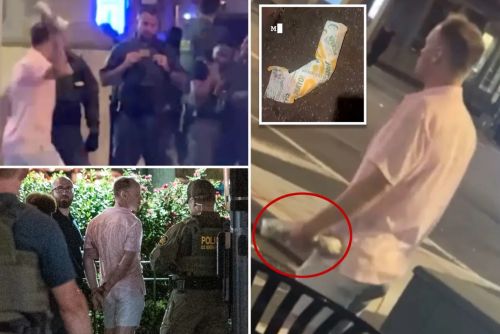

The hoagie that would not stick has become something more than a sandwich. It is a reminder that even in moments of absurdity, jurors can exercise quiet forms of resistance.

By Matthew A. McIntosh
Public Historian
Brewminate
A Hoagie in the Dock
In a case that might otherwise have remained a local oddity, a federal grand jury has declined to indict Sean Dunn for throwing a hoagie sandwich at a federal law enforcement officer during a protest in Washington, D.C. The incident, captured on video and circulated widely on social media, had been elevated into a national talking point by conservative commentator and recently-appointed U.S. Attorney for the District of Columbia Jeanine Pirro.
Pirro, in a sharply delivered video, scolded audiences that Dunn’s actions were no laughing matter. She warned that hurling a sandwich at a federal officer was a felony assault, and her clipped delivery left no space for levity. That posture now looks increasingly brittle. The grand jury’s refusal to hand up an indictment not only undercut her performance but also signaled that the federal government’s appetite for such prosecutions may be out of step with the public mood. The only ham indicted was what Pirro did on camera.
The Context of Federalization
The episode does not unfold in a vacuum. Since returning to office in January, President Trump has aggressively pursued a strategy of federalizing law enforcement. He dispatched federal officers to Washington under the justification of restoring order, and more recently expanded federal presence into other cities under the banner of security.
Critics view this as a dangerous centralization of police power, blurring the distinction between local authority and national control. By treating a sandwich toss as a federal matter, prosecutors risked validating those fears. The attempt to turn a street scuffle into a felony case illustrates how easily symbolic incidents can be conscripted into the administration’s broader narrative of toughness.
Jury Nullification or Simple Restraint?
Why did the jury refuse to indict? On paper, the video evidence was clear: Dunn did throw the hoagie. Legally, assault on a federal officer is a chargeable offense as a felony, and food objects have in past cases been treated as “dangerous instruments” under creative prosecutorial theories. Yet the jurors balked.
One interpretation is that they engaged in jury nullification, using their discretion to deliver a political message. By refusing to indict, they may have been signaling disapproval of the administration’s use of federal troops in the capital. Another view is less dramatic: jurors simply considered the charge disproportionate, unwilling to equate a sandwich toss with a violent felony.
The truth may lie somewhere in between. Even if jurors were motivated by fairness rather than politics, their decision reflects a public unease with the government’s increasingly heavy hand. The law may permit such charges, but justice often demands proportionality.
The Pirro Factor
Jeanine Pirro’s involvement highlights the performative dimension of the case. Her video, widely shared among conservative networks, was intended to project gravity. She insisted that there was nothing humorous in attacking federal officers and that Dunn deserved felony treatment. Yet the more severe her tone, the more it underscored the absurdity of the underlying facts.
Commentators across the spectrum have since noted that Pirro’s stern delivery has been thrown back in her face by the jury’s decision. What was meant as a moment of political clarity now reads as overreach. Her framing may have reinforced for many observers the sense that the administration and its allies are grasping at straws to justify sweeping federal interventions.
Broader Implications
The hoagie case is minor in scale but revealing in implication. It demonstrates the limits of federal authority when filtered through ordinary citizens serving on a jury. No matter how aggressive the administration’s posture, prosecutors cannot compel indictments where the public finds them disproportionate.
It also raises questions about how far Trump’s strategy of federalizing the police can go before encountering systemic resistance. If jurors are unwilling to back charges in trivial cases, what will happen in more serious ones where the line between political protest and criminal conduct is deliberately blurred?
The rejection does not end the administration’s campaign. Federal troops remain deployed in the capital, and Trump continues to argue that centralized control is necessary for national security. Yet the episode suggests that even in an age of polarized politics, citizens are capable of drawing their own lines.
Conclusion: A Sandwich and a Signal
The refusal to indict Sean Dunn for throwing a hoagie may seem a comic footnote. Yet its resonance lies in what it reveals about the state of American democracy. A jury of ordinary citizens looked at a federal prosecution and declined to give it legitimacy.
Whether viewed as nullification or simple restraint, the decision reflects a desire to push back against disproportionate uses of power. In doing so, it cast doubt not only on the wisdom of the prosecution but on the broader project of federalized policing itself.
The hoagie that would not stick has become something more than a sandwich. It is a reminder that even in moments of absurdity, jurors can exercise quiet forms of resistance, signaling that democracy is not only written in statutes but enacted in the judgment of everyday citizens.
Originally published by Brewminate, 09.02.2025, under the terms of a Creative Commons Attribution-NonCommercial-NoDerivatives 4.0 International license.


